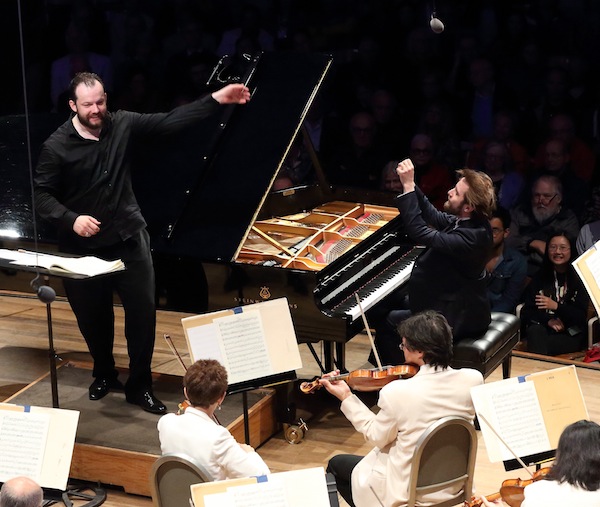Trifonov brings stellar artistry to Mozart with BSO at Tanglewood

Daniil Trifonov performed Mozart with Andris Nelsons and the Boston Symphony Orchestra Friday night at the Tanglewood Festival. Photo: Hilary Scott
The past season of the Boston Symphony Orchestra has featured some celebrated pianists in performances of Mozart. Mitsuko Uchida and Menahem Pressler gave shimmering and poetic renditions of the composer’s piano concertos No. 20 and No. 27, respectively), in Symphony Hall.
Friday night at Tanglewood’s Koussevitzky Shed it was Daniil Trifonov’s turn with Mozart’s Piano Concerto No. 21 in a concert led by music director Andris Nelsons. Through playing of emotional poignancy and precision, Trifonov’s performance made for a joyous evening in the Berkshires.
Though only 26, the Russian pianist has quickly vaulted into the front ranks of piano virtuosi for his mature interpretations that combine fire and sensitivity. His playing Friday night was nimble and elegant. Lines were shaped in flowing arcs, and Trifonov’s tone at the keyboard resonated with pearly depth.
Mozart’s Concerto No. 21 is rife with difficult passages in its outer movements, and the pianist was in command performing with boldly projected energy. Yet his playing also had subtle shades of expression, particularly in the second theme of the first movement, where Trifonov found a searching mystery.
Mozart left no cadenzas for this concerto, so Trifonov performed his own. In the outer movements, his cadenzas developed the themes into a flurries of running octaves. The third movement’s cadenza even looked back to a theme from the first movement to bring the work to a tidy conclusion.
The most beautiful moment of the evening came in the second movement, one of Mozart’s most affecting and familiar melodies. Trifonov shaped the phrases with a subtle sense of freedom, his lines melding with solo oboe and flute for music that was transfixing.
Nelsons led a sensitive accompaniment from the orchestra, taking to care to draw out graceful wind solos to complement Trifonov’s fine achievement at the keyboard. As an encore, the pianist offered a sly and darkly humorous rendition of the Gavotte from Prokofiev’s Cinderella, Op. 95, No. 2.
The rest of the program revealed a similar level of classical grace. Thomas Adès’ Three Studies from Couperin, written in 2006, is a transcription of three of Couperin’s keyboard pieces for chamber orchestra. Each movement is a colorful display of orchestration. Themes burble to the surface in the first movement, where they twist and turn before dying away. Couperin’s flowering melodies culminate in a roiling texture in the second. And in the third, a bass drum supplies powerful emphasis for resonant moments in the movement’s death-haunted music. Through it all, Nelsons led a committed performance.
Nelsons hasn’t conducted much of Haydn’s music since coming to the BSO. But his attention to detail in Haydn’s Symphony No. 83 in G minor, heard Friday night, revealed a mind well attuned to the composer’s style.
The work is nicknamed “La Poule” (The Hen) due to the clucking theme of the first movement. There, Nelsons drew the requisite humor from the passage. But in the bulk of the other movements the conductor commanded playing of driving energy. The passages in the development section of the first movement built to stormy heights. The tremolos and cascading figures that burst from the soft chugging chords in the second movement sounded with appropriate drama, and the Minuet flowed with a graceful lilt.
The woodwinds performed with aplomb in the opener, Ravel’s Le Tombeau de Couperin. Oboe flourishes in the Prelude turned like eddies in a stream, and solo bassoon and flutes supplied silvery textures in Forlane. In the middle section of Rigaudon, Nelsons drew out lines not usually heard in performances of this work. Basses and cellos added a gentle conterpoint that had just enough weight to tether the music to the ground. Here too, the Menuet was a scene of floating phrases and elegance. The classical style, indeed, stretches well beyond the eighteenth century.
Andris Nelsons will lead the Boston Symphony Orchestra and guest soloists in a concert performance of Wagner’s Das Rheingold 8 p.m. Saturday at the Koussevitzky Shed. bso.org; 888-266-1200.
Posted in Performances